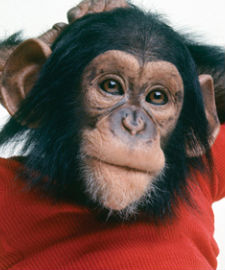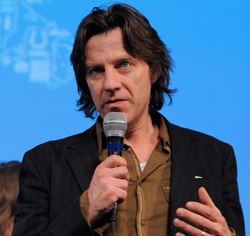Project Nim Opens Sundance, Proves Life Stranger Than Fiction
 It says something that out of four feature-length films opening the 2011 Sundance Film Festival, the hottest ticket in town wasn't the celebrity doc (Sing Your Song) or the buddy cop thriller starring two famous-for-an-indie-movie stars (The Guard). Instead, Thursday's big premiere was Project Nim -- or, as it was referred to around Park City, "the monkey movie" -- a documentary by returning Grand Jury Prize/Audience Award winner James Marsh, whose first and last Sundance debut (Man on Wire) went on to win an Oscar.
It says something that out of four feature-length films opening the 2011 Sundance Film Festival, the hottest ticket in town wasn't the celebrity doc (Sing Your Song) or the buddy cop thriller starring two famous-for-an-indie-movie stars (The Guard). Instead, Thursday's big premiere was Project Nim -- or, as it was referred to around Park City, "the monkey movie" -- a documentary by returning Grand Jury Prize/Audience Award winner James Marsh, whose first and last Sundance debut (Man on Wire) went on to win an Oscar.
Because of Man on Wire's tremendous critical reception two years ago here at Sundance, Marsh is something of Sundance nobility -- not quite royalty yet, but if Project Nim is any indication, he'll get there. Sharply but not judgmentally observed and dynamically edited, the documentary follows the remarkable and tragic life of Nim Chimpsky, a chimpanzee raised from infancy to behave, communicate, and sometimes even smoke joints like a human person by a (mostly) loving assembly of hippie academics in 1970s New York.
Of course, the inception of said experiment is just the jumping off point for Nim's eventful life story, and the film takes unexpected dramatic twists and turns thanks to the volatile humans he interacts with over the years. Marsh's gaze lingers heavily on the people who tangled with the nature vs. nurture theory in the name of science, most of whom now seem to look back with some measure of guilty regret for their misguided efforts and inability to ease Nim's emotional, psychological, and even (in one hard-to-watch sequence of actual medical lab footage) his physical suffering.
Those humans in Nim's life are at times infuriating and heartbreaking themselves, and quickly threaten to overshadow their young primate charge. Nim's first foster mother is a New York psychoanalysis nut with a Brady Bunch brood who breast feeds her chimpanzee baby and develops a weird, weird fascination with his burgeoning sexual awareness. Others are sympathetic grad student types who grow to love Nim but let their own feelings of sadness -- not to mention a very real fear of danger -- preclude their commitment to helping him. The adult Nim's abandonment in the equivalent of chimp prison (and his subsequent sale to a maybe-sketchy medical experimentation lab/concentration camp for primates) isn't just a low point in his life, it's rock bottom for the humans who broke their implicit promise to care for him. But that in turn begs the question: Once Nim was taken from his own mother and placed among humans, the damage was already done.
 The sold-out audience at Project Nim's premiere screening applauded with moderate enthusiasm (there were no standing ovations as at the premiere of Pariah across town, by contrast) but a ripple went through the crowd as Marsh (left) and producer Simon Chinn called five of Nim's real-life humans up to the stage for the post-screening Q&A. Conspicuously, one key player was absent: Dr. Herb Terrace, the researcher responsible for starting the project in 1973.
The sold-out audience at Project Nim's premiere screening applauded with moderate enthusiasm (there were no standing ovations as at the premiere of Pariah across town, by contrast) but a ripple went through the crowd as Marsh (left) and producer Simon Chinn called five of Nim's real-life humans up to the stage for the post-screening Q&A. Conspicuously, one key player was absent: Dr. Herb Terrace, the researcher responsible for starting the project in 1973.
Terrace, for all intents and purposes, is both the father of Project Nim and the villain of Project Nim. Accused, as the film unfolds, of being a publicity hound, a callous ladies' man, and an uncaring scientist who ultimately dumped Nim into chimpanzee Oz when the project no longer seemed feasible and then refuted his own research years later, Terrace was unsurprisingly not present for the love fest following the show. In the film, Marsh ends each interview by having Terrace's disgruntled former colleagues sit in a chair and gaze into the camera with increasingly evident displeasure. It's not hard to imagine that they were directed to picture Terrace's face on the lens.
All of this dramarama, both on screen and off, should only help Project Nim gain momentum as recent acquirer HBO hunts for theatrical distribution during the fest. It shouldn't be too difficult; this is exactly the kind of documentary that Robert Redford championed in his opening remarks, and just the kind of film to continue the strong history of docs that premiere in Park City.
[James Marsh photo: Getty Images]

Comments
So this year Chimpsky is all the rage in Park City; last year it was Banksy.